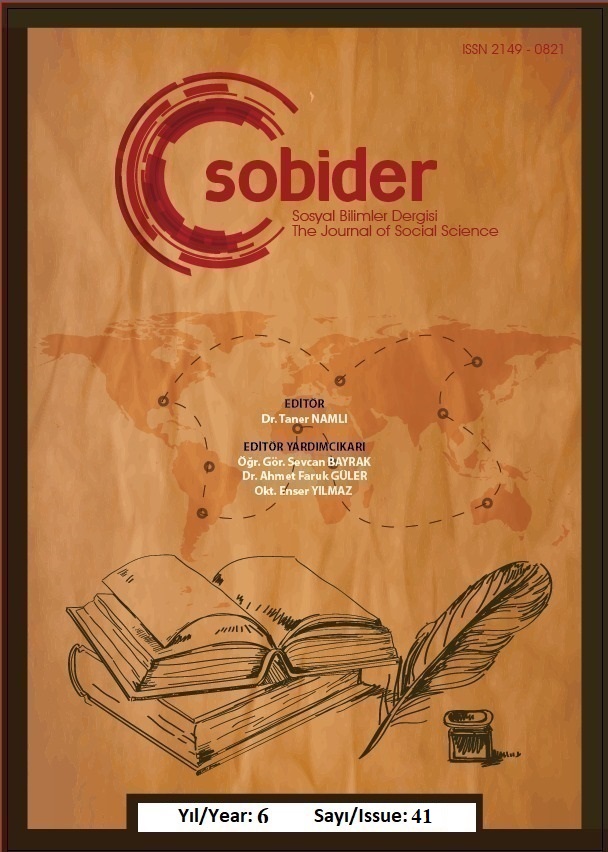Author :
Abstract
Birinci Dünya Savaşı’nın başlamasından endişeye kapılan Osmanlı idarecileri, İtilaf Devletleri nezdinde ittifak girişimlerinde bulundular. Ancak bu girişimlerden olumu bir netice alamayınca Almanya’ya yöneldiler. Almanya ile gizli bir şekilde yürütülen görüşmeler, 2 Ağustos 1914’de anlaşmanın imzalanmasıyla neticelendi. İttifak anlaşmasından sonra iki ülke idarecilerinin kararı ile Alman savaş gemileri Goeben ve Breslau, 10 Ağustos 1914’te Çanakkale Boğazı’nı geçerek İstanbul’a geldi. Osmanlı Devleti, İtilaf Devletleri ile arasında krize sebep olan bu sorunu, 12 Ağustos 1914’de iki gemiyi satın alındığını açıklayarak çözmek istedi. Satın alma açıklamasından sonra iki geminin komutanı olan Amiral Souchon, Osmanlı Donanması 1. Kumandanlığına atandı. Amiral Souchon’un ısrarla donanmanın Karadeniz’e çıkarılması talebi, Başkumandanlık Vekâleti tarafından 5 Ekim 1914 tarihinde kabul edildi. 29 Ekim 1914’de Amiral Souchon idaresinde Karadeniz’e açılan Osmanlı donanmasının 29-30 Ekim tarihinde Rus limanlarını bombardıman etmesi ile Osmanlı Devleti fiilen savaşa girmiş oldu. Anahtar Kelimeler: Osmanlı Devleti, Birinci Dünya Savaşı, Osmanlı-Alman İttifak Anlaşması, Goeben ve Breslau.
Keywords
Abstract
Worried about the start of the first World War, the Ottoman rulers made alliances with the Entente States. However, when these attempts failed to produce a result, they turned to Germany. The secret negotiations with Germany resulted in the signing of the Treaty on August 2, 1914. After the alliance agreement, the German warships Goeben and Breslau, by decision of the two countries ' administrators, crossed the Dardanelles on 10 August 1914 and arrived in Istanbul. After the alliance agreement, the German warships Goeben and Breslau, by decision of the two countries ' administrators, crossed the Dardanelles on 10 August 1914 and arrived in Istanbul. Admiral Souchon, commander of the two ships after the announcement of the purchase, was the 1st commander of the Ottoman navy. He was appointed commander. Admiral Souchon's insistent request for the removal of the Navy to the Black Sea was accepted by the Acting Commander-in-chief on 5 October 1914. 29 October October 1914 under the direction of Admiral Souchon, the Ottoman navy opened to the Black Sea 29-30 October, the Russian ports on the bombardment of the Ottoman Empire was actually entered into the war.
Keywords
- Agayef, A. (15 Ağustos 1914). “İtalya ve Balkan Devletleri”, Tercüman-ı Hakikat, No:11977.
- Akşin, S. (1998). Ana Çizgileriyle Türkiye’nin Yakın Tarihi, İmaj Yayınevi, Ankara.
- Alkan, N. (2014). “Alman Kaynaklarına Göre Osmanlı Devleti’nin Birinci Dünya Savaşı’na Girmesi” 1914’ten 2014’e 100’üncü Yılında Birinci Dünya Savaşı’nı Anlamak, (Uluslararası Sempozyum 20-21 Kasım 2014 – İstanbul) Editör: Zekeriya Türkmen, s.157-178, Harp Akademileri Basımevi, İstanbul.
- Armaoğlu, F. (1992). 20. Yüzyıl Siyasi Tarihi (1914-1990), C. I: 1914-1980, Türkiye İş Bankası Yayınları, Ankara.
- Atabay, M. (Bahar 2015). “Osmanlı İmparatorluğu Hizmetinde Breslau (Midilli) Kruvazörü”, Çanakkale Araştırmaları Türk Yıllığı, Y. 13, S. 18, s. 117-129, Çanakkale.
- Babacan, H. (2005). Mehmet Talat Paşa (1874-1921), TTK Yayınları, Ankara.
- Baykara, T. (1985). Milli Mücadele, Kültür ve Turizm Bakanlığı Yayınları, Ankara.
- Bayur, Y. H. (1991). Türk İnkılâbı Tarihi, C.II, K. 3-4, TTK Yayınları, Ankara.
- Bayur, Y. H. (1991). Türk İnkılâbı Tarihi, C.III, K. 1, TTK Yayınları, Ankara.
- Belen, F. (1973). XX. Yüzyılda Osmanlı Devleti, İstanbul.
- Beydilli, K. (1999). Osmanlı Tarihi, C.I, İstanbul.
- Birinci Dünya Harbinde Türk Harbi, (1970). C.I, Genelkurmay Basımevi, Ankara.
- Birinci Dünya Harbinde Türk Harbi, Deniz Harekâtı, (1976). C.VIII, Genelkurmay Basımevi, Ankara.
- Bostan, H. (1992). Said Halim Paşa, İstanbul.
- Cemal Paşa (2001). Hatıralar, (Haz. Alpay Kabacalı), Türkiye İş Bankası Yayınları, İstanbul.
- Çavdar, T. (1995). Talat Paşa, Ankara.
- Erickson, E. J. (2003). Size Ölmeyi Emrediyorum (Birinci Dünya Savaşı Sırasında Osmanlı Ordusu), Kitap Yayınevi, İstanbul.
- Ersoy, E. ve Aksoy M. T. (1994). Türkiye Federal Almanya İlişkilerinin Dünü, Bugünü, Yarını, Harp Akademileri Komutanlığı Yayınları, İstanbul.
- Görgülü, İ. (1993). On Yıllık Harbin Kadrosu (1912-1922), TTK Basımevi, Ankara.
- İnönü, İ. (1985). Hatıralar, C.I, (Haz. Sabahattin Selek), Bilgi Yayınları, Ankara.
- Karabekir, K. (1994). Birinci Cihan Harbine Nasıl Girdik, C. II, Emre Yayınları, İstanbul.
- Karal, E. Z. (1994). Büyük Osmanlı Tarihi, C.V, TTK Yayınları, Ankara.
- Kılıç, S. (2014). “Birinci Dünya Savaşı’na Uzanan Süreçte Türk-Alman Yakınlaşması”, 1914’ten 2014’e 100’üncü Yılında Birinci Dünya Savaşı’nı Anlamak, (Uluslararası Sempozyum 20-21 Kasım 2014–İstanbul), Editör, Zekeriya Türkmen, s.91-156, Harp Akademileri Basımevi, İstanbul.
- Kış, S. (2017) ” Birinci Dünya Savaşı’nın Seyrini Değiştiren Goeben ve Breslau Gerçeği” , Çanakkale Araştırmaları Türk Yıllığı, S. 22, s.63-86, Çanakkale.
- Kraus-Karl D. (2013). Goeben ve Breslau’nun Deniz Seferleri, (Çev. Mustafa Haydar Cümbüş), Orient Yayınları, Ankara.
- Kurtoğlu, F. (2015). Birinci Dünya Savaşı ve Çanakkale’de Türk Donanması, Gezegen Basım, İstanbul.
- Mehmet Tevfik Bey’in (Biren), II. Abdülhamid, Meşrutiyet ve Mütareke Devri Hatıraları,(1993). C.II, (Haz. F. Rezan Hürmen), Arma Yayınları, İstanbul.
- Menteşe, H. (1986). Osmanlı Mebusan Meclisi Reisi Halil Menteşe’nin Anıları, Hürriyet Vakfı Yayınları, İstanbul.
- Pomiankowiski, J. (1990). Osmanlı İmparatorluğu’nun Çöküşü (1914-1918 I. Dünya Savaşı), (Çev. Kemal Turan), Kayıhan Yayınları, İstanbul.
- Sabis, A. İ. (1991). Harp Hatıralarım, 1. Dünya Harbi, C.I, Nehir Yayınları, İstanbul.
- Sander, O. (2007). Siyasi Tarih (İlk Çağlardan 1918’e), İmge Kitabevi Yayınları, Ankara.
- Shaw, S. ve E. K. Shaw (1983). Osmanlı İmparatorluğu ve Modern Türkiye, (Çev. Mehmet Harmancı), C.II, E Yayınları, İstanbul.
- Talat Paşa, (2003). Talat Paşa’nın Anıları, (Haz. Alpay Kabacalı), İş Bankası Kültür Yayınları,
- Tunçay, M. (1997). Türkiye Tarihi (Çağdaş Türkiye 1908-1980), C. IV, Yayın Yönetmeni: Sina Akşin, Cem Yayınları, İstanbul.
- Türkgeldi, A. F. (1987). Görüp İşittiklerim, TTK Yayınları, Ankara.
- Uçarol, R. (1995). Siyasi Tarih (1789-1994), Filiz Kitabevi, İstanbul.
- Ünal, T. (1998). Türk Siyasi Tarihi (1700-1958), Kamer Yayınları, İstanbul.
- Yılmaz, V. (1993). 1.nci Dünya Harbi’nde Türk-Alman İttifakı ve Askeri Yardımlar, İstanbul.
- Zürcher, E. J. (2010). Modernleşen Türkiye’nin Tarihi, İletişim Yayınları, İstanbul.
- Tanin. (26 Temmuz 1330). No:2021.
- Tanin. 28 Temmuz 1330, No:2023.
- Tanin. (30 Temmuz 1330). No: 2024.
- Tanin. (7 Ağustos 1914). No:2020.
- Tercüman-ı Hakikat. (8 Ağustos 1914). No:11970.
- Tercüman-ı Hakikat. (9 Ağustos 1914). No:11971.





